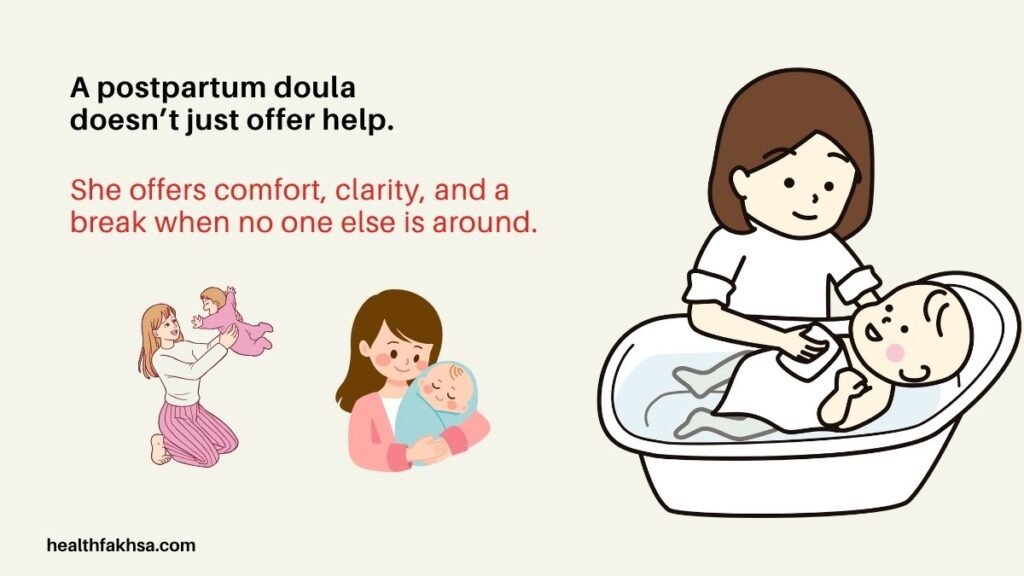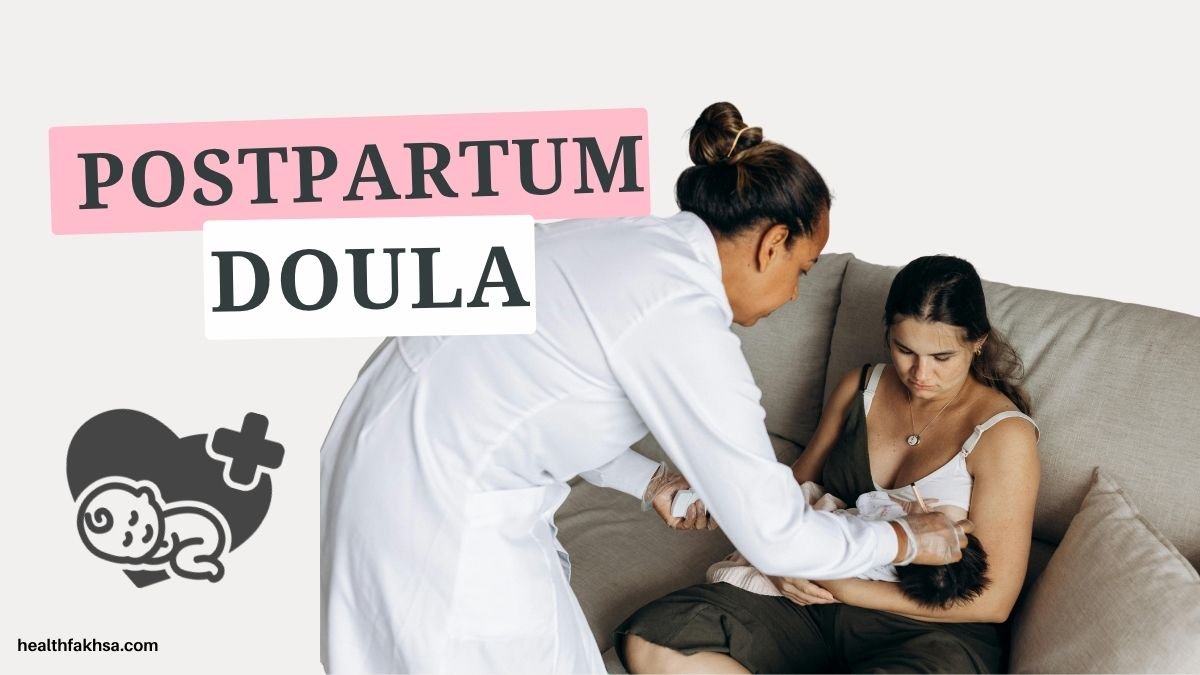Welcoming a baby into the world is beautiful—but it’s also exhausting, overwhelming, and deeply emotional. In those raw, sleep-deprived days after birth, many moms find themselves silently asking, “Why didn’t anyone prepare me for this part?”
That’s exactly where a postpartum doula comes in.
A postpartum doula is not a nurse or nanny. She’s a lifeline—a gentle guide through the emotional fog, physical recovery, and new-mom uncertainty. Whether you’re bleeding, healing, leaking, or just trying to eat a hot meal again, a postpartum doula is trained to help without judgment.
Let’s break down what a postpartum doula really does, why more moms are choosing them, and how you can even become one yourself.
What Is a Postpartum Doula, Really?
Unlike labor doulas who support you during birth, postpartum doulas focus on the early days and weeks after delivery. They are trained professionals who provide non-medical physical, emotional, and informational support to the mother (and family) after childbirth.
Think of them as a blend of:
- A wise best friend
- A calm presence in chaos
- A baby-care educator
- A safe space for you to cry, vent, or just breathe
They aren’t there to take over your parenting—but to help you step into it with more confidence and less overwhelm.
What Does a Postpartum Doula Do for New Moms?
Here’s what a typical postpartum doula might help with:
- Newborn care basics: diapering, feeding cues, safe sleep
- Emotional check-ins: talking through your birth, fears, or “baby blues”
- Feeding support: breastfeeding help, bottle prep, or pumping advice
- Household help: laundry, simple meals, light tidying
- Sibling and partner support: helping the whole family adjust
The key is: they support YOU, not just the baby. They show up so you don’t have to “hold it all together” alone.
Postpartum Doula vs. Baby Nurse: What’s the Difference?
Postpartum Doula:
- Focuses on the mother’s recovery and emotional wellbeing
- Provides education, reassurance, and hands-on help
- Trained in emotional support, breastfeeding, postpartum mood disorders
Baby Nurse (or Night Nurse):
- Primarily focused on newborn care
- May have medical background (e.g., RN or LPN)
- Often hired for overnight shifts or sleep training
If you’re looking for someone to help YOU feel better and stronger while adjusting to motherhood, a postpartum doula is the better fit.
Why You Might Need a Postpartum Doula More Than You Think

Most new moms underestimate how vulnerable they’ll feel after birth. Especially if:
- You had a traumatic delivery or C-section
- You’re recovering without family nearby
- You have a history of anxiety, depression, or mood disorders
- You’re navigating breastfeeding challenges
- You’re parenting twins or a NICU baby
A postpartum doula doesn’t just offer help. She offers comfort, clarity, and a break when no one else is around.
How to Find the Right Postpartum Doula
Finding a doula who feels like a match matters. Here’s where to start:
- Ask local parenting groups or birth centers for recommendations
- Look up certified doulas through organizations like:
- DONA International
- CAPPA
- Childbirth International
- DONA International
- Interview candidates: Ask about training, experience, approach, and cultural fit
- Clarify expectations: Will they help overnight? Are they infant CPR certified?
The right doula will listen to your needs—not come in with a one-size-fits-all script.
How to Become a Postpartum Doula
This growing field is attracting people with deep empathy, patience, and a love for nurturing others. Here’s how to start:
- Take a certified training through DONA, CAPPA, or another respected body
- Complete readings, workshops, and observation hours
- Get CPR/First Aid certified
- Build experience by volunteering or working with families
You don’t need to be a nurse or mom yourself. What matters most is that you can listen, support without judgment, and show up with compassion.
Many postpartum doulas turn this into a flexible, rewarding part-time or full-time career—supporting families while also creating income and impact.
Is Being a Postpartum Doula a Good Career Path?
If you’re drawn to caregiving, emotional support, and making a real difference, this may be your calling.
Pros:
- Flexible scheduling
- Deeply rewarding work
- Growing demand in both urban and rural areas
- Opportunities for niche work (e.g., NICU, LGBTQ+ families, trauma-informed care)
Cons:
- Physically and emotionally demanding
- May require building a client base from scratch
- Income varies by location and availability
But if helping a new mom cry, heal, laugh, and feel strong again sounds like meaningful work—you’re in the right place.
FAQs About Postpartum Doulas (U.S.-Specific)
Do postpartum doulas stay overnight?
Yes, many do. Overnight postpartum doulas typically help with newborn care while the parent sleeps, offering bottle-feeding support, diaper changes, and calming techniques.
How much does a postpartum doula cost in the U.S.?
Costs vary by region, but most postpartum doulas charge $25–$50 per hour or more. Some offer packages or sliding scales.
Can a postpartum doula help with postpartum depression?
They are not therapists, but they are trained to spot early signs of mood disorders and provide emotional support. They also guide moms to professional resources if needed.
Are doulas covered by insurance in the U.S.?
Most private insurers do not cover doula services directly, but some Health Savings Accounts (HSA/FSA) can be used. A few states (like Oregon and Minnesota) are piloting Medicaid coverage for doulas.
Bottom Line: The Postpartum Doula Is the Missing Piece for Many Moms
There’s so much focus on pregnancy and birth—but not nearly enough on what happens after. That blurry, beautiful, vulnerable fourth trimester is where a postpartum doula makes all the difference.
She brings calm. She brings clarity. She holds your baby so you can shower. She holds your heart when you’re too tired to speak. Whether you’re considering hiring one—or becoming one—know this: postpartum care is not a luxury. It’s a lifeline.

